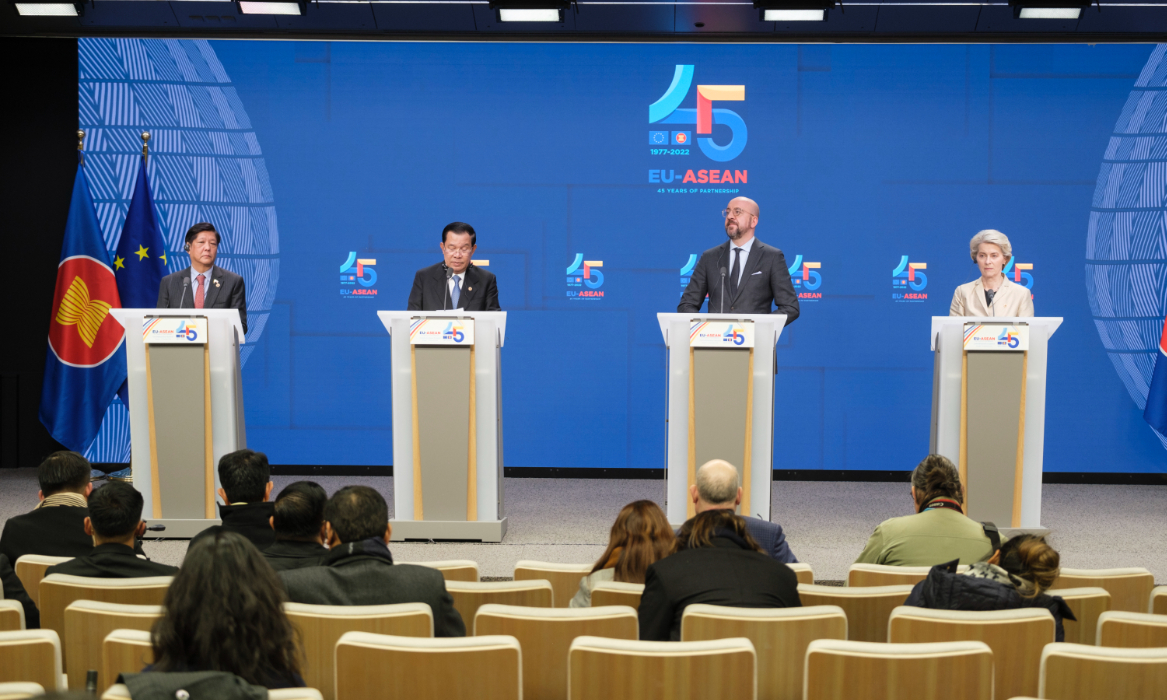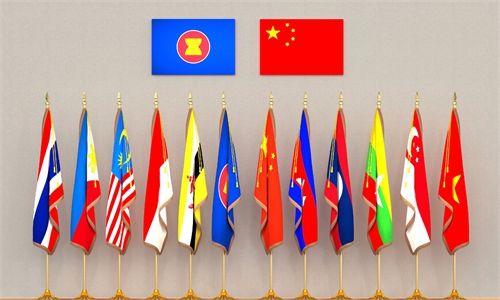ASEAN-EU summit shows ‘Asia-Europe cooperation needs mutual respect, target no third party’

President of the Philippines Ferdinand "Bongbong" Romualdez Marcos Jr., Prime Minister of Cambodia Hun Sen, President of the European Council Charles Michel and President of the European Commission Ursula von der Leyen (from left to right) talk to media at the end of ASEAN-EU summit in the EU Council headquarters on December 14, 2022 in Brussels, Belgium. Photo: VCG
ASEAN and the EU, two of China's major trade partners, have concluded their first-ever summit in Brussels with a joint statement indicating that Asian and European countries share a common interest in boosting cooperation to overcome common challenges, with Chinese analysts saying that major Western countries will continue seeking solutions to their urgent problems by boosting cooperation with the developing world, and Asian countries will have more opportunities.
Some media reports argued that the EU is trying to reduce its reliance on China's market by boosting ties with ASEAN, but experts noted that China has an irreplaceable position in the world economy, and it's also the major trade partner for the EU and ASEAN, so it's not realistic for China, the EU and ASEAN to exclude each other, and when Western countries seek cooperation with Asia, they should learn to respect the differences and reality in Asia, and should never target any third party.
China is not worried about the exchange between the EU and ASEAN, as the EU is different from the US, with the latter aiming to disrupt the security and peace in the region and promote military alliances to contain China, while European countries are relatively more interested in cooperation based on actual economic demands, and boosting connectivity across the Eurasian continent is also a goal of the China-proposed Belt and Road Initiative, said analysts.
Xu Liping, director of the Center for Southeast Asian Studies at the Chinese Academy of Social Sciences, told the Global Times on Thursday that "China holds a positive and open attitude to any cooperation between its partners that targets no third party. We sincerely hope the development of ties between the ASEAN and the EU is based on their own fundamental interests."
The EU-ASEAN summit and the US-Africa summit have been held recently, which shows that Western countries are being beset by many serious problems and increasingly seeking opportunities from the developing world, Li Haidong, a professor at the Institute of International Relations at the China Foreign Affairs University, told the Global Times on Thursday.
But the difference is that the US is openly seeking a new cold war and is eyeing great power competition, while the EU is more focused on seeking possibilities around the globe to solve its urgent problems caused by the Ukraine crisis, said Wang Yiwei, director of the Institute of International Affairs at the Renmin University of China.
Joint statement
In the Joint Leaders' Statement of the EU-ASEAN commemorative summit issued on Wednesday, the two sides, while covering broad global issues, avoided the sensitive topic that is China's core interest and internal affair - the Taiwan question.
On the South China Sea issue, the statement said, "We recognize the benefits of having the South China Sea as a sea of peace, stability, and prosperity… We encourage all countries to avoid any unilateral actions that endanger peace, security and stability in the region."
This is a responsible stance, and the "unilateral actions that endanger peace, security and stability in the region" could refer to the provocative activities conducted by US warships in the region and military actions carried out by external forces that threaten peaceful solutions among the regional countries, experts said.
On the Ukraine crisis, the statement said, "Most members strongly condemned the war in Ukraine…There were other views and different assessments of the situation and sanctions. We continue to reaffirm, as for all nations, the need to respect the sovereignty, political independence, and territorial integrity of Ukraine."
Analysts said this is very similar to the G20 summit's joint statement, which shows that ASEAN doesn't want to join bloc-to-bloc confrontation, and wants to be balanced and neutral on the complicated issue of the Russia-Ukraine crisis.
Li said if the EU wants to cooperate with ASEAN, it should respect the fact that ASEAN members don't want to get involved in the geopolitical crisis in Europe, and neither do they want external forces to become involved in issues in their region.
"ASEAN countries are very different from EU members. For instance, Indonesia is a Muslim country, and Vietnam is a socialist country, while others like Singapore, Thailand, Cambodia and Laos all have their special political systems and cultural backgrounds, so it would be laughable and ridiculous for the Western world to lecture them about 'Western democracy' or 'universal values.' Mutual respect is highly important for Europe-Asia cooperation," Li noted.
ASEAN's voices
According to the South China Morning Post, ASEAN members said at the summit that they want a free-trade deal with Europe rather than handouts, and do not want to be a pawn in great-power rivalries, its leaders said in Brussels on Wednesday.
The EU did announce a 10 billion Euro (US$10.7 billion) infrastructure package of grants and loans for ASEAN states, but Hun Sen, the Cambodian prime minister and outgoing ASEAN chair, warned Brussels that the group was not interested in "always receiving help" from Europe and preferred a trade deal, according to the South China Morning Post.
"ASEAN is not always waiting for help from the EU, but [we] need to see the complementarity of the economies of the two regions," he said. Concerning Myanmar, he said "politics should not hinder" EU-ASEAN progress.
"It's true that European countries are more advanced, but ASEAN is not just a place to receive assistance … ASEAN and Europe [should] agree to have a free-trade agreement," said the Cambodian prime minister.
Analysts said that the extent to which the EU can implement its commitment to ASEAN is also in question due to the uncertainties caused by the geopolitical problems in Europe and the "checks and balances" within the EU political system, so ASEAN members consider a free trade deal to be more reliable.
Philippine President Ferdinand Marcos Junior warned at the summit that the region - often described as a "swing state" in the US-China rivalry - was not happy to be caught in the geopolitical crossfire.
"We absolutely refuse to go back to the situation of the Cold War, where we have to pick sides in terms of which superpower we are aligned with," he said.
Li said this has reflected a common concern shared by ASEAN members, especially those with military alliances with the US, so the EU's cooperation with ASEAN should ease rather than worsen such concerns, and not harm ASEAN's ties with other major countries.


